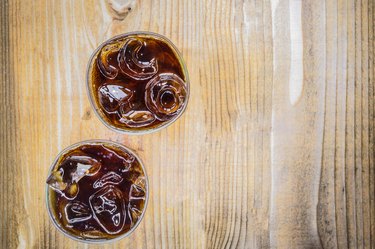
Many people think that because diet soda has no sugar or calories, it's healthy — relative to regular soda. Unfortunately, the artificial sweeteners used to sweeten diet soda aren't so sweet. Symptoms of drinking too much diet soda may include diarrhea.
The Sweet Stuff
Video of the Day
Artificial sweeteners aren't anything new. The ubiquitous saccharin was discovered at Johns Hopkins University in 1878, according to an older review published in the Journal of Pharmacology and Pharmacotherapeutics in December 2011. But the last few decades have seen a rise in popularity due to increased interest in health and weight loss in the general public.
Video of the Day
Since 1878, many more artificial sweeteners have come into commercial use. Some have been determined unsafe for consumption, such as cyclamate, which was banned in the U.S. in 1970. Today, the most commonly used FDA-approved artificial sugars are:
- Acesulfame-K
- Aspartame
- Saccharin
- Sucralose
- Stevia
Most of these were discovered by accident, reports the University of Michigan, by scientists who unintentionally ingested certain chemicals and found that they had a sweet flavor.
Sweet is an understatement. Acesulfame-K is 200 times sweeter than sugar, saccharin is 300 to 400 times sweeter, and sucralose is 600 times sweeter.
Read more: Foods to Eat to Stop Diarrhea
The only one on this list that isn't a chemical is stevia, which is derived from the stevia plant. It's often included on the list of artificial sweeteners, but it's entirely natural.
Sugar alcohols are also natural substances from plants. They provide few to no calories because they are not metabolized in the body like sugar. According to Yale New Haven Health, sugar alcohols are converted slowly to glucose and have little effect on blood sugar.
Some sugar alcohols used in foods include:
- Mannitol
- Sorbitol
- Xylitol
- Lactitol
- Isomalt
- Maltitol
- Erythritol
Diet Soda and Diarrhea
Artificial sweeteners have well-known laxative effects. The International Foundation for Gastrointestinal Disorders reports that chronic diarrhea is usually due to something in the diet that is consumed in large amounts, especially sugar and chemicals.
It's not just the chemical sweeteners that cause problems. Many people have trouble digesting sugar alcohols — and the more they consume, the more digestive distress they experience. According to a review in Advances in Nutrition in July 2017, most adults in good health can consume around 10 grams of sorbitol with only mild digestive symptoms. Over that amount, the risk of more severe symptoms increases.
For reference, a typical piece of gum sweetened with sorbitol contains 1.25 grams, according to the Canadian Society of Intestinal Research. It's hard to know how many grams of sugar alcohols or artificial sugars are in your diet soda because manufacturers aren't required to provide exact amounts.
Could Be the Caffeine
Have you ever noticed that, after your morning coffee you feel the urge to go? According to the University of Florida Health, caffeine stimulates the intestines. If you you drink a lot of caffeinated diet soda, that may be why you find yourself running to the toilet more often.
The International Foundation for Gastrointestinal Disorders reports that the caffeine in more than two cups of coffee could cause diarrhea. This is especially true for people who are sensitive to the effects of caffeine or have digestive disorders such as irritable bowel syndrome.
It's possible that the combination of caffeine and artificial sweeteners is making things worse. You could try an experiment: Drink non-caffeinated diet soda for a week and see if you still have diarrhea. If not, then it's the caffeine. If so, then it's the artificial sweeteners.
Better yet, give up diet soda all together. If you cut out regular soda and started drinking diet soda as a replacement, that's certainly a change for the better. In moderation, diet soda isn't unhealthy, says Katherine Zeratsky, RD, LD, of the Mayo Clinic. But if you're drinking a lot of it and/or it's giving you diarrhea, it's a good idea to cut back or cut it out.
- Journal of Pharmacology and Pharmacotherapeutics: "Sugar Substitutes: Health Controversy Over Perceived Benefits"
- Yale New Haven Health: "Eat Any Sugar Alcohol Lately?"
- Advances in Nutrition: "A Systematic Review of the Effects of Polyols on Gastrointestinal Health and Irritable Bowel Syndrome"
- Canadian Society of Intestinal Research: "Sugar-Free Gum and Candies"
- University of Florida Health: "Irritable Bowel Syndrome"
- Mayo Clinic: "I Drink Diet Soda Every Day. Could This Be Harmful?"
- University of Michigan: "Fake Sweeteners Make for Real Problems"
- International Foundation for Gastrointestinal Disorders: "Common Causes of Chronic Diarrhea"